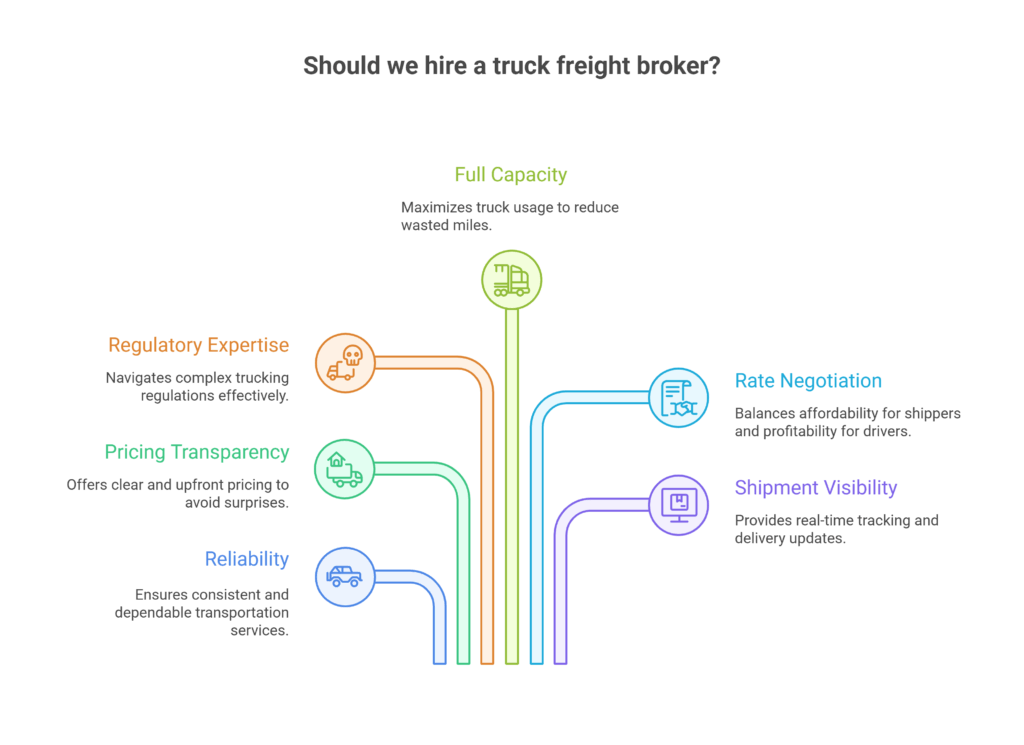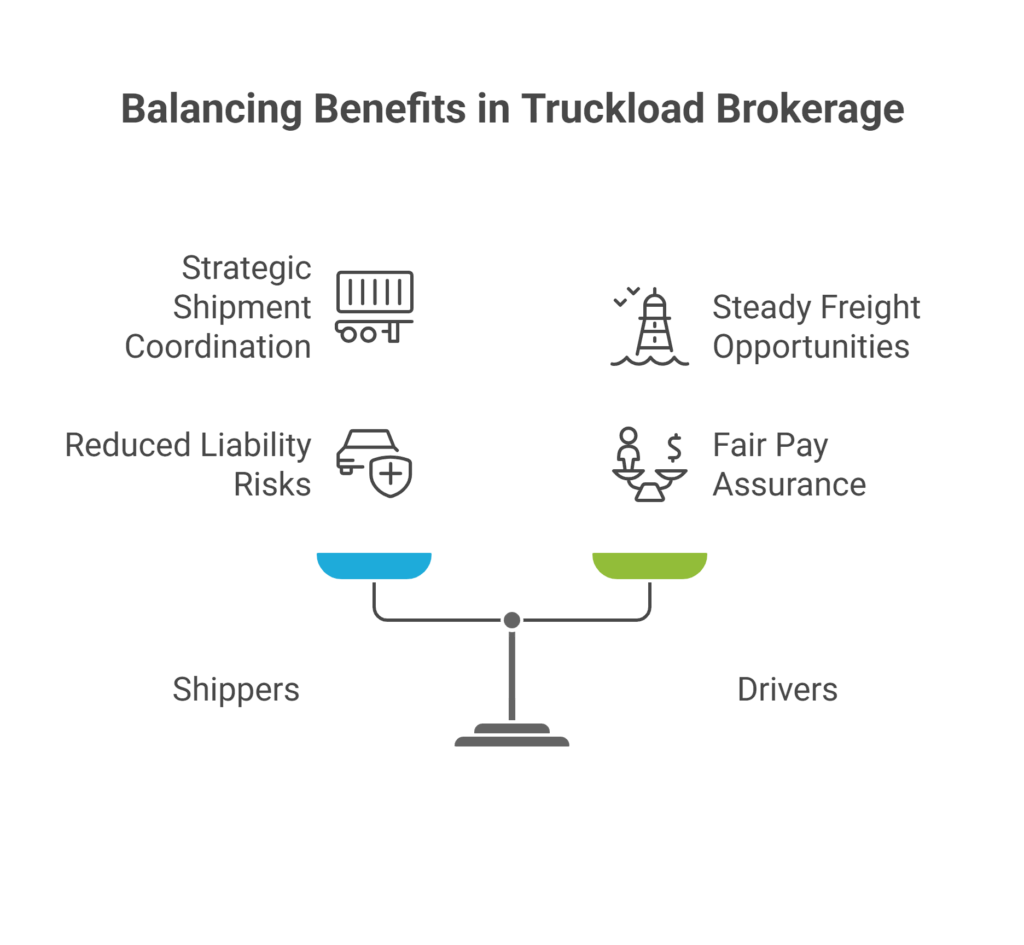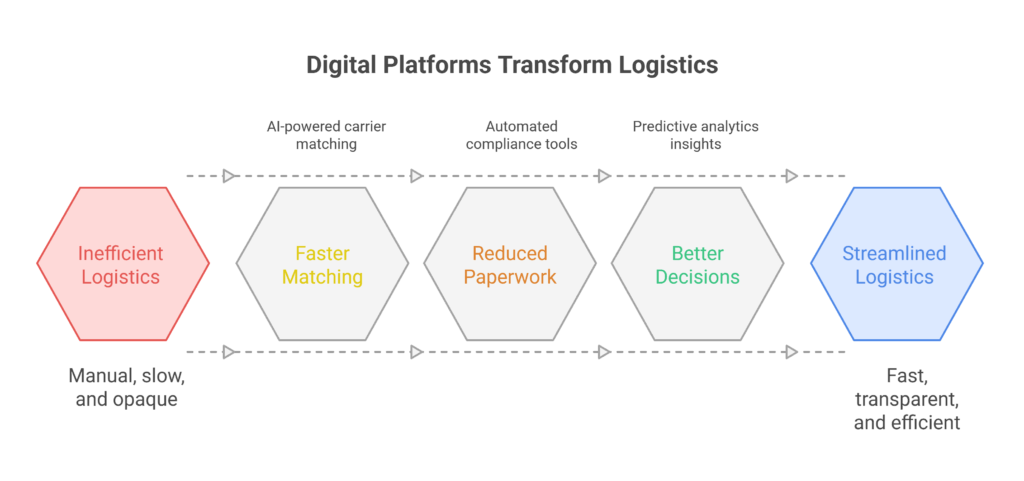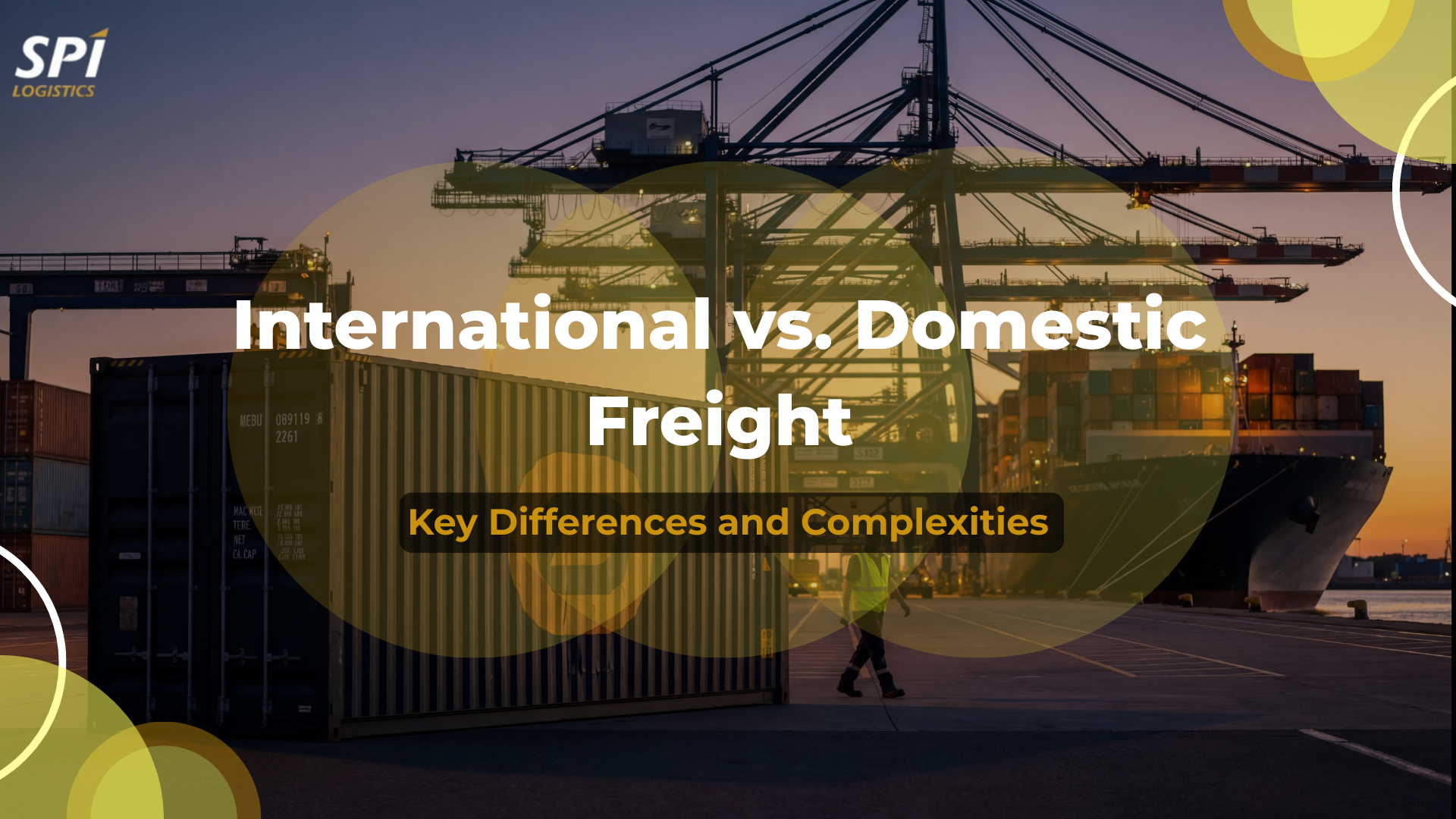Imagine having a logistics partner who can instantly connect your shipment with the perfect carrier, saving time and reducing costs, this is what a freight broker does. That’s why finding the right partners, whether freight brokers, truck brokers, or other specialists, is critical to saving money, improving reliability, and keeping operations running smoothly. By understanding the role of local freight brokers and how they connect shippers with the best carriers, you’ll gain a competitive edge in logistics management.
What Is a Truck Freight Broker?
A truck freight broker serves as the link between shippers who need goods transported and carriers who have available capacity. Unlike general freight brokers, these professionals specialize in coordinating truckload and less-than-truckload (LTL) shipments. Businesses searching for truck freight brokers often want reliability, pricing transparency, and expertise in trucking regulations.
According to Armstrong & Associates (2023), truckload brokerage services accounted for 69% of the U.S. domestic freight brokerage market, showing the dominance of trucking-specific brokers in logistics.
“A great truck freight broker doesn’t just book a load, they build lasting partnerships that keep supply chains moving efficiently.”
Do you believe working with a truck freight broker adds more value in cost savings or in improving shipment reliability?
Why Local Freight Brokers Are Essential to Your Business
Relying solely on carriers can lead to missed opportunities and fluctuating rates. Local freight brokers act as intermediaries who understand the regional market, connect you with vetted drivers, and ensure your loads move without delays. If you’ve ever searched for freight brokers near me, you’ve likely noticed that proximity means faster communication, stronger trust, and better service.
- They negotiate better rates on your behalf
- They vet carriers to ensure compliance and reliability
- They handle paperwork, scheduling, and problem-solving

According to Armstrong & Associates (2023), U.S. domestic brokerage services account for over $106 billion in annual logistics spend, proving the widespread reliance on brokerage partners.
“Shippers who partner with regional brokers often cut transport costs by up to 15% due to stronger carrier relationships and optimized route planning.”
What qualities do you value most when choosing local freight brokers, price, reliability, or customer service?
The Role of Truck Brokers in Streamlining Shipments
When companies search for truck brokers near me, they’re looking for someone who can balance cost-efficiency with reliability. Truck brokers bridge the gap between shippers and carriers, making sure every truckload is used efficiently.
For example, a small business moving palletized goods might not know which carriers have available capacity. This is where a broker for truckers steps in, connecting drivers with the right loads while ensuring shippers pay competitive rates.
- Improve load visibility and reduce empty miles
- Provide access to nationwide carrier networks
- Streamline communication between shipper and driver
DAT Freight & Analytics (2024) reports that using truck brokers reduces average transportation costs by 12% through smarter lane planning and load consolidation.
“Brokers give smaller shippers access to the same carrier networks as large corporations, leveling the playing field.”
Have you ever worked with a broker for truckers who went above and beyond to solve a shipping challenge?
Truckload Brokerage: Efficiency in Large Shipments
For businesses moving full truckloads, truckload brokerage plays a pivotal role in ensuring on-time delivery. Unlike partial loads, truckload shipments require precise coordination, and having access to a reliable truck load brokerage service reduces risks of delays.
A broker for trucking service ensures that large shipments aren’t just moved but moved strategically, factoring in lane optimization, market rates, and specialized carriers. For drivers, working with a broker for truck drivers means steady freight opportunities and fair pay.
- Matches shippers with capacity in real time
- Provides load tracking and customer support
- Reduces liability risks for both parties

The American Transportation Research Institute (2024) found that truckload brokerage solutions cut average transit times by 8%, largely due to improved scheduling tools.
“Digital brokerage solutions are speeding up freight booking while improving communication between shippers and drivers.”
Do you think investing in digital truckload brokerage platforms is more effective than relying on traditional phone-based negotiations?
Specialized Brokers for Truck Drivers and Shippers
Finding the right brokers for truck drivers is just as important as finding the right carriers. For drivers, partnering with a broker for truck loads or a truck freight broker means consistent work and fewer deadhead miles. For shippers, choosing the right truck freight brokers guarantees higher accountability.
Meanwhile, businesses exploring load brokerage or brokerage for trucking services gain flexibility to manage seasonal surges without committing to long-term contracts. This makes it easier to stay competitive in unpredictable markets.
FMCSA data (2024) shows that there are over 21,000 active licensed freight brokers in the U.S., highlighting how critical these intermediaries are for drivers and shippers alike.
“Brokers provide balance. They not only secure better rates for shippers but also ensure truckers stay profitable during slow seasons.”
From your perspective, who benefits more from brokerage for trucking? shippers or drivers?
The Growing Role of Digital Load Brokerage Platforms
Technology is reshaping logistics, and load brokerage platforms are at the center of this transformation. Instead of relying solely on phone calls and emails, shippers and carriers are now using digital platforms that provide instant quotes, shipment visibility, and automated documentation.
- Faster carrier matching powered by AI
- Reduced paperwork through automated compliance tools
- Better decision-making with predictive analytics

McKinsey & Company (2024) estimates that digital freight platforms could capture up to 20% of the brokerage market by 2030, driven by growing adoption of automation in logistics.
“Digital platforms are becoming essential for brokers who want to scale operations and provide real-time visibility to clients.”
Are you exploring smarter ways to manage freight operations with technology? Discover how the right digital tools can transform efficiency in brokerage by visiting SPI Freight Broker Technology
Brokerage for Trucking
Brokerage for trucking offers shippers flexibility to manage uncertain demand while giving carriers access to a consistent flow of work. For smaller businesses, this flexibility means the ability to compete with larger corporations without investing in their own fleets.
- Provides shippers with access to thousands of carriers
- Helps drivers find work during low-demand seasons
- Mitigates risks through contractual agreements and insurance coverage
A DAT Freight & Analytics (2024) survey found that over 60% of small to mid-sized shippers rely on brokerage for at least part of their trucking needs.
“Flexibility is the biggest advantage of brokerage services, it allows both sides to navigate uncertain markets with confidence.”
Looking for guidance on how to successfully launch your own freight brokerage? Get step-by-step insights and proven strategies in this resource: How to Start Your Own Freight Brokerage
Frequently Asked Questions (FAQs)
1. What’s the difference between freight brokers and truck brokers?
Freight brokers manage various shipment types including LTL, FTL, and intermodal, whereas truck brokers focus primarily on truckload services. Both help shippers reduce costs by finding reliable carriers. Businesses searching for freight brokers near me often discover local truck specialists as part of their network.
2. How do I choose the right broker for trucking?
To choose the right broker for trucking, you should verify their licensing and FMCSA registration, examine their carrier vetting process, and check online reviews for truck brokers near me to ensure they provide reliable customer support.
3. Why should truck drivers work with brokers?
Truck drivers should work with brokers for truck drivers because they provide steady loads, handle negotiations so drivers can focus on deliveries, and reduce risks of unpaid invoices through factoring partnerships.
Finding the Right Freight Broker
Whether you’re searching for freight brokers near me, exploring truckload brokerage, or evaluating local freight brokers, the right partner can make or break your logistics strategy. Brokers bring cost savings, efficiency, and reliability that self-managed shipping often lacks. By leveraging both human expertise and modern digital platforms, you can dominate your logistics and move your business forward with confidence.
Looking for a trusted freight partner to streamline your operations? Contact us and let’s move your business forward together.
References
Armstrong & Associates. (2023). U.S. Freight Brokerage Market Overview. Retrieved from https://www.armstrongandassociates.com
DAT Freight & Analytics. (2024). Truckload Brokerage Cost and Efficiency Analysis. Retrieved from https://www.dat.com
American Transportation Research Institute. (2024). Truckload Brokerage Transit Time Study. Retrieved from https://truckingresearch.org
FMCSA. (2024). Active Licensed Freight Brokers in the U.S. Retrieved from https://www.fmcsa.dot.gov
McKinsey & Company. (2024). Digital Freight Platforms and Market Adoption Forecast. Retrieved from https://www.mckinsey.com




